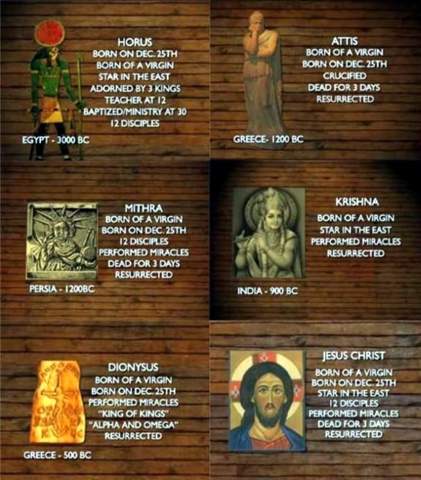Jesus und Dionysos Kreuzigung?
Video Stelle ist verlinkt:
https://youtu.be/XAkRM8-2jMQ?t=655
Es gibt auch so ein Bild:
Ich brauche schon zuverlässige Quellen, wenn hier was widerlegt wird, also bitte nicht nur irgendwelche Aussagen

3 Antworten

Der folgende Artikel ist zur Frage empfehlenswert: Is Jesus a copy of Dionysus?

A second occurrence of possible Dionysian influence is the allegory found in John 15:1–17, in which Jesus declares himself to be the "True Vine",[90] a title reminiscent of Dionysus, who was said to have discovered the first grape vine
Hm, das finde ich wenig überzeugend und würde eher eine Nähe zu Noah als zu Jesus bedeuten. Was in diesem Abschnitt nicht rauskommt, an jener Stelle in Joh 15,1 sagt Jesus "Ich bin der Weinstock", er meint die Pflanze, nicht das Getränk.
Miraculously, Dionysus turns the drink into wine.[89]
Hat mich e schon immer gewundert woher das EvJoh die Weinwundergeschichte genommen hat, aber auch hier sind die Parallelen echt gering. Mehr als die Wundertat selbst ist es nicht. Und die kann scheint mir im EvJoh eher im Kontext des Abendmahls ihren Ursprung zu haben, das im EvJoh bewusst nicht erwähnt wird.
Schade, hätte es spannend gefunden wenn es da mehr Parallelen geben würde.

mehr Parallelen geben würde.
gibt es:
... and involves Dionysus as a central character. In both works, the central figure is portrayed as an incarnate deity who arrives in a country where he should be known and worshipped, but, because he is disguised as a mortal, the deity is not recognized and is instead persecuted by the ruling party.
https://en.wikipedia.org/wiki/Jesus_in_comparative_mythology


Ob und wie Dionysus einen Einfluss hatte, ist ein hart umkämpftes Thema und nicht leicht von der Hand zu weisen:
Scholars have long suspected that the Gospel of John may have also been influenced by symbolism associated with the cult of Dionysus, the Greek god of wine.
The issue of whether the Gospel of John was truly influenced by the cult of Dionysus is hotly disputed,[16] with reputable scholars passionately defending both sides of the argument
https://en.wikipedia.org/wiki/Jesus_in_comparative_mythology
Eine Verbindung zu Horus ist ziemlich konstruiert und unbelegt. Die originalen ägyptischen Quellen zu Horus enthalten nicht das, was behauptet wird.
Verschiedene Autoren, darunter Richard Carrier, haben nachgewiesen, dass die von Murdock behaupteten Parallelen zwischen Horus und Jesus nicht existieren und durch willkürlich gedeutete verstreute Bildsymbole und Berufung auf nachchristliche Autoren konstruiert wurden.
Originale ägyptische Quellen zu Horus enthalten keine der behaupteten Analogien zu Jungfrauengeburt, Taufe, Jüngerwahl, Lehrtätigkeit, Verrat durch einen Jünger, Kreuzigung und Auferstehung Jesu Christi am dritten Tag
https://de.m.wikipedia.org/wiki/Jesus-Mythos
Zu Krishna, Horus und Mithras:
Die US-amerikanischen Autoren Dorothy M. Murdock (Autorenname: Arachya S.), Tom Harpur, Timothy Freke und Peter Gandy vertreten erneut die These, Jesus sei eine Kopie eines Astralmythos und paganer Götter wie Krishna, Horus und Mithras.
Sie beschreiben diese als Erlösergottheiten bzw. „Christusse“ (Plural) und berufen sich dazu auf Autoren des 19. und frühen 20. Jahrhunderts wie Godfrey Higgins, Gerald Massey und Alvin Boyd Kuhn.
Diese hatten schon zu ihrer Zeit keine Anerkennung in Orientalistik und Ägyptologie gefunden, da Primärquellen keine Belege für ihre Thesen enthalten.[83]
Gleichwohl übernahmen und verbreiteten einige Filme diese Thesen, darunter The God Who Wasn’t There (2005), Zeitgeist (2007) und Religulous (2008).


Was ist dann mit Dionysos
Ob und wie dieser einen Einfluss hatte, ist ein hart umkämpftes Thema und nicht leicht von der Hand zu weisen:
Scholars have long suspected that the Gospel of John may have also been influenced by symbolism associated with the cult of Dionysus, the Greek god of wine.
The issue of whether the Gospel of John was truly influenced by the cult of Dionysus is hotly disputed,[16] with reputable scholars passionately defending both sides of the argument
https://en.wikipedia.org/wiki/Jesus_in_comparative_mythology

Nehmen wir an, es ist alles so, wie es im Video dargestellt wird.
Das würde heissen, dass alles über Jesus erfunden wurde. Jesus hätte nicht existiert. Er wäre nicht am Kreuz gestorben und auferstanden.
Weshalb die Geschichte, allenfalls nur textliche Verbindungen hat, ist das Wirken von Jesus seither.
- Weshalb sollten Männer todesmutig eine Geschichte verbreiten, die ihnen nur Gewalt und Schmerz zufügen wird. Für mich nur mit der Begegnung mit dem auferstandenen Jesus erklärbar.
- Seit Jahrtausenden berichten Menschen über Begegnungen mit Jesus. Über Gebetserhörungen. Alles erfunden? Psychologisch konstruiert?
https://www.youtube.com/results?search_query=Mensch+Gott+Jesus
Deine Seite behauptet:
tja ...
https://en.wikipedia.org/wiki/Jesus_in_comparative_mythology